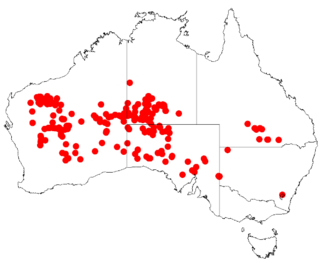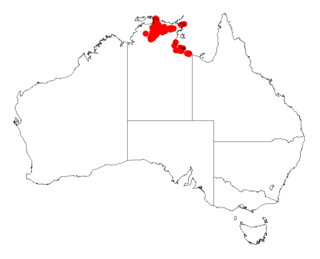
Acacia ayersiana is a plant that grows in arid areas of Australia.

Acacia cremiflora, is a small wattle plant occurring in parts of inland New South Wales. It may be seen growing near Orange and Yerranderie. It was first collected on 15 May 1972. The attractive yellow or cream flowers may appear at any time of the year.

Acacia effusifolia is a shrub or tree belonging to the genus Acacia and the subgenus Juliflorae. It is native to an area in the Mid West and the Wheatbelt regions of Western Australia.
Acacia gibsonii, commonly known as Gibson's wattle, is a shrub belonging to the genus Acacia and the subgenus Juliflorae.

Acacia latior is a shrub belonging to the genus Acacia and the subgenus Juliflorae that is endemic to western Australia.

Acacia oncinocarpa is a shrub or tree belonging to the genus Acacia and the subgenus Juliflorae that is endemic to northern Australia.

Acacia pellita is a shrub or tree belonging to the genus Acacia and the subgenus Juliflorae that is endemic to parts of tropical northern Australia.

Acacia ramulosa, commonly known as horse mulga or bowgada wattle, is a shrub belonging to the genus Acacia and the subgenus Juliflorae endemic to arid areas of Australia.

Acacia repanda is a shrub belonging to the genus Acacia and the subgenus Juliflorae that is endemic to a small area in western Australia.

Acacia rhodophloia, commonly known as minni ritchi or western red mulga, is a tree or shrub belonging to the genus Acacia and the subgenus Juliflorae that is endemic to a large area of arid central western Australia. The Indigenous group the Kurrama peoples know the plant as mantaru.

Acacia stipuligera is a tree or shrub belonging to the genus Acacia and the subgenus Juliflorae. It is native to arid and tropical parts of northern Australia.

Acacia subcontorta is a shrub belonging to the genus Acacia and the subgenus Juliflorae that is endemic to central and central western Australia.
Acacia synantha, also known as sandstone synchronous wattle, is a tree or shrub belonging to the genus Acacia and the subgenus Juliflorae. It is native to a small area in the Kimberley region of Western Australia.

Acacia merrallii, commonly known as Merrall's wattle, is a shrub belonging to the genus Acacia and the subgenus Phyllodineae that is endemic to south western and southern Australia.

Acacia scalena is a shrub of the genus Acacia and the subgenus Phyllodineae that is endemic to a small area in western Australia.

Acacia chrysopoda is a shrub of the genus Acacia and the subgenus Plurinerves that is endemic to an area of south western Australia.

Acacia nuperrima is a shrub of the genus Acacia and the subgenus Plurinerves that is endemic to a large area across northern Australia.

Acacia striatifolia is a shrub or tree belonging to the genus Acacia and the subgenus Juliflorae that is native to north eastern Australia.

Acacia producta is a shrub of the genus Acacia and the subgenus Plurinerves that is endemic to northern central Australia.

Acacia kalgoorliensis is a shrub of the genus Acacia and the subgenus Plurinerves that is endemic to an area of south western Australia.


















